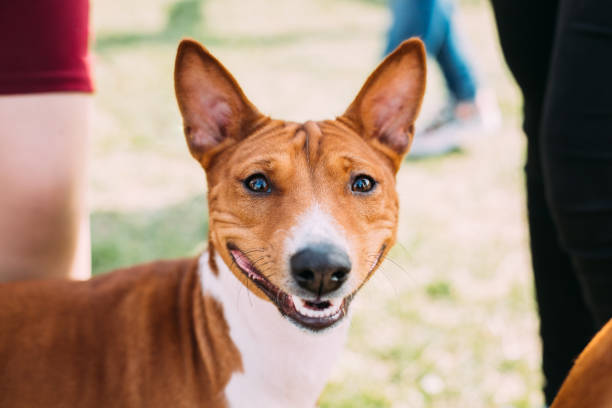Basenjis, often described as “barkless dogs,” are a unique and ancient breed with a fascinating history. To truly understand these dogs, it’s essential to delve into their origins and purpose. In this comprehensive article, we will explore the primary reasons why Basenjis were bred and how their unique characteristics make them a remarkable breed.
1. The Origins of Basenjis:
1.1 Ancient African Roots:
Discuss the historical origins of Basenjis in Central Africa.
Mention archaeological findings that trace their roots back to ancient civilizations.
1.2 Hunting Companions:
Explain how Basenjis were originally bred as hunting dogs.
Highlight their skills in tracking and catching prey, including small game.
2. Adaptation to Harsh Environments:
2.1 Heat Tolerance:
Describe how Basenjis have evolved to thrive in hot climates.
Mention their unique physiology, including a curled tail and short coat, aiding in heat dissipation.
2.2 Silent Hunters:
Explain the “barkless” nature of Basenjis and how it benefits them during hunting.
Discuss their distinctive yodel-like vocalization, known as a “barroo.”
3. Basenjis as Companion Animals:
3.1 Transition to Household Pets:
Describe how Basenjis have transitioned from hunting dogs to beloved household pets.
Discuss their adaptability to urban living conditions.
3.2 Loyal and Independent:
Highlight the Basenji‘s loyal and independent nature.
Explain their strong bonds with their human families.
4. Athletic and Energetic:
4.1 Exercise Needs:
Discuss the Basenji’s high energy levels and exercise requirements.
Offer suggestions for keeping them mentally and physically stimulated.
4.2 Agility and Sports:
Mention their agility and suitability for dog sports like lure coursing and agility trials.
5. Basenji’s Role in Modern Society:
5.1 Show Dogs:
Explain how Basenjis have become popular in dog shows.
Mention their distinctive appearance and breed standards.
5.2 Therapy and Service Dogs:
Discuss their potential as therapy and service dogs due to their intelligence and adaptability.
6. Health Considerations:
6.1 Common Health Issues:
List common health concerns that Basenji owners should be aware of.
Emphasize the importance of regular veterinary check-ups.
6.2 Responsible Breeding:
Advocate for responsible breeding practices to maintain the breed’s health and integrity.
In conclusion, Basenjis are a breed with a rich history and diverse roles in today’s society. Whether as skilled hunters in their African homeland or cherished companions in households around the world, Basenjis continue to capture hearts with their unique traits and abilities. Understanding their origins and purpose enhances our appreciation for these remarkable dogs.
FAQs related to Basenjis:
Q1: Can Basenjis adapt to urban living conditions?
A1: Yes, Basenjis can adapt to urban living conditions, but it’s important to provide them with ample exercise and mental stimulation. They are an active and energetic breed, so regular walks and playtime are essential to keep them happy and healthy in urban environments.
Q2: Are Basenjis good family pets?
A2: Basenjis can make excellent family pets, but they have an independent nature. They tend to form strong bonds with their human families and are known for their loyalty. Early socialization and training are crucial to ensure they get along well with children and other pets in the household.
Q2: Do Basenjis participate in dog sports?
A2: Yes, Basenjis excel in dog sports like lure coursing and agility trials. Their athleticism, agility, and high energy levels make them well-suited for these activities. Engaging in sports can help fulfill their physical and mental exercise needs.
Q3: What are some common health issues in Basenjis?
A3: Basenjis are generally healthy dogs, but they can be prone to certain health issues, including hip dysplasia, progressive retinal atrophy (PRA), and Fanconi syndrome. Regular veterinary check-ups and responsible breeding practices can help mitigate these concerns.
Q4: Are Basenjis used as therapy or service dogs?
A4: Yes, Basenjis have been used as therapy and service dogs in some cases. Their intelligence, adaptability, and loyalty can make them suitable candidates for these roles. However, not all Basenjis are suited for such work, and it depends on individual temperament and training.
Q5: What are the characteristics of a Basenji show dog?
A5: Basenji show dogs should adhere to breed standards, which include characteristics like a curled tail, a short and sleek coat, and a distinctive forehead wrinkle. They should also exhibit grace, balance, and symmetry in their appearance.
Q6: How can I find a responsible Basenji breeder?
A6: To find a responsible Basenji breeder, look for breed clubs and associations that maintain breeder directories. Additionally, ask for recommendations from Basenji enthusiasts, visit breeder websites, and inquire about health testing and socialization practices when contacting breeders.


